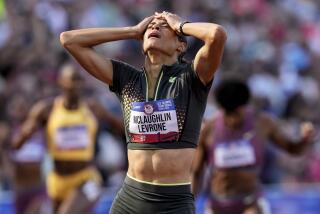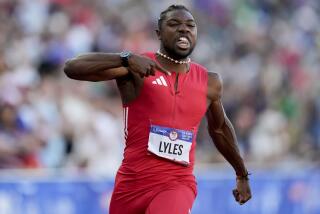Butch Reynolds Faces Biggest Challenge
- Share via
DES MOINES, Iowa — Butch Reynolds is getting ready for the race of his life. Only it won’t be run on a track.
Reynolds, the world record holder at 400 meters, goes to London later this month for a hearing that could bring him out of the limbo in which he has been dangling for two years. It could determine whether he watches the Barcelona Olympics on television or runs in them.
The International Amateur Athletic Federation will hear Reynolds’ appeal of his 1990 suspension for steroid use -- an action he has been fighting at considerable expense.
Reynolds has been cleared to run in the United States, giving him a chance to qualify for the Olympic Trials in June. But unless he gets a favorable ruling from the IAAF, Reynolds couldn’t run in Spain even if he made the U.S. team.
His suspension is to expire Aug. 13. The Olympics end Aug. 9.
And while he tries to stay positive, the stress of the battle its taking a toll on the lanky 27-year-old runner.
“I feel confident in the decision that is going to be made,” Reynolds said. “I’m just looking forward to going in and getting it behind me. I’m ready to fight on the track. I’m tired of fighting legally and in court and in politics.”
That fight began after a test showed traces of the steroid nandrolone in Reynolds’ urine sample at a meet in Monaco on Aug. 12, 1990.
Reynolds had set the world 400 record of 43.29 seconds in Zurich, Switzerland, two years earlier and won the Olympic silver medal in Seoul. He was in the prime of his sprinting years when suddenly, he was knocked off the track.
The news hit Reynolds’ former coach, Russ Rogers, like a sledgehammer to the forehead.
“I was completely shocked and dumbfounded,” said Rogers, who coached Reynolds in 1987 and ’88 and is now the head coach at Ohio State. “I was really devastated. We knew other guys who were using drugs and Butch and I used to talk about it a lot -- about the disgrace of using drugs to enhance their performance.
“To this day, I don’t think Butch was using it.”
Reynolds has maintained his innocence throughout. The fight to clear his name already has cost him upwards of $150,000 in legal fees and he isn’t finished yet. He still has to fly to London with his lawyers to appear before the IAAF on May 10 and 11.
While happy he can at least run in this country, Reynolds is bitter the fight has gone on solong.
“That’s the system that I’m in,” he said. “The system is not geared for protection of an athlete. The system is geared for the protection of the system. Once the athlete, as myself, had to protest the system, it was hard to do. That’s why it’s taken so long.
“Sometimes they just don’t want to admit a mistake was made. This could be a human error. People do make mistakes.”
And Reynolds has no doubt a mistake was made in handling his test.
“There’s no more think,” he said. “There was a mistake.”
Rogers also thinks Reynolds’ test was mishandled, noting that nandrolone isn’t even used any more. He also said Reynolds might have spared himself the agony of the last two years by appealing the test right away.
“When it first happened, when they were told he had tested positive, Butch didn’t really take it seriously,” Rogers said. “He had an agent who was handling it and he more or less let this guy do it. The guy wasn’t familiar with the process so it sort of got out of hand.
“Before Butch had written a protest, it had gone beyond the date for doing that. If he had contacted me, I could have done something right away.”
Reynolds won a partial victory in early April when The Athletics Congress, which governs U.S. track, allowed him to run in this country. A TAC panel ruled that irregularities in the testing of Reynolds’ sample left “too much doubt to find against him.”
TAC then appealed on Reynolds’ behalf to the IAAF, setting up the hearing in London. The IAAF could reinstate Reynolds, affirm the suspension or send the case to binding arbitration. If the arbitration panel backed Reynolds, the IAAF would have to reinstate him.
But Reynolds needs more than a favorable ruling to run in the Olympics. He first has to qualify for the Olympic Trials. Assuming he can to that, he’d then have to run fast enough to make the team -- no easy task for someone coming off an 18-month layoff.
Reynolds has run twice since getting TAC’s clearance and has missed the Olympic Trials qualifying mark both times. He ran 45.92 seconds at Stanford on April 18 and had the same time at the Drake Relays the following weekend.
It takes a 45.80 by June 13 to guarantee a spot in the trials, and Reynolds would have to go at least a second faster than that to have a chance of making the U.S. team. Reynolds is confident of beating that time, although he admitted he didn’t think it would take more than two races to do it.
“I’ve come to find out the lack of running and the lack of racing takes its toll,” he said. “Right now there’s a lot of tension and stress because of the hearing and because I wanted that time. Instead of being real cool, calm and collected like Butch Reynolds runs and trains, there’s a little bit more stress and pressure now.”
The IAAF could end that stress this month.
“I’m very confident it’s going to be resolved and I will be permitted to run anywhere I choose,” Reynolds said. “That’s going to be a great day for Butch Reynolds. That’s going to be a nightmare I can finally put to rest and get on with my life.”
More to Read
Go beyond the scoreboard
Get the latest on L.A.'s teams in the daily Sports Report newsletter.
You may occasionally receive promotional content from the Los Angeles Times.






